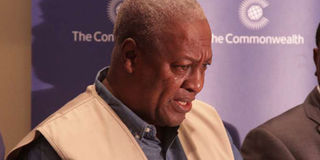Mahama calls for peaceful polls

John Dramani Mahama (center), the chairman of the Commonwealth Election Observer Mission, speaks during a press conference at Crowne Plaza, Nairobi, on August 3, 2017. He has called for a peaceful election. PHOTO | EMMA NZIOKA | NATION MEDIA GROUP
What you need to know:
- He argues that African countries should be treated as separate entities, charting their own paths.
- Ghana became a democracy after going through five illegal changes of government and ethnic clashes.
John Dramani Mahama may have been an accidental president, going to bed one night in 2012 as vice-president before waking up the next day as head of state.
But the former Ghanaian leader has lived to be an example across Africa, where losers often cry foul.
Mr Mahama was defeated last December in elections in his country and promptly conceded defeat, paving the way for a peaceful transition.
FAIR POLLS
Now, the man who headed Africa’s posterchild of democracy will be heading a team of 15 Commonwealth observers to check if the August 8 elections in Kenya will be free and fair.
In announcing the appointment, Commonwealth Secretary-General Patricia Scotland said Mr Mahama and his team will be up to the task and hoped the elections will be free and fair.
“I am grateful to former President Mahama and members of this Commonwealth Observer Group for agreeing to undertake this important exercise on behalf of the Commonwealth,” she said.
PEACE
“These elections represent another positive step towards consolidating the reform and devolution drive.
"In this spirit, we urge all stakeholders in Kenya to commit to ensuring peaceful and transparent elections in which candidates and voters are free from intimidation; and the fundamental freedoms of expression, association and assembly are respected.”
His team — which includes, former diplomats and senior government bureaucrats from various Commonwealth member states — “will assess a number of factors to ensure the credibility of the electoral process as a whole”.
SUCCESS
This includes the pre-electoral environment, the voting, counting and tabulation procedures, as well as the announcement of results.
The independent group will determine whether the polls have been conducted according to the standards to which Kenya has committed itself.
Mr Mahama, who accepted the appointment and promptly travelled to Nairobi this week, said the election will be “critical”.
“(I am) praying for a successful and peaceful elections,” he wrote on his Twitter page.
WEALTH
Born of a wealthy rice farmer and politician in Ghana, Mr Mahama was raised in affluence.
In his memoir My First Coup d’Etat, he says he could be chauffeured from school to home, one of the few with tin roofs, and got educated in Ghana and the Soviet Union — studying history, communication and later psychology.
Ghana had been under Dr Kwame Nkrumah and Mr Mahama’s father had been minister in his government.
ARREST
The former president argues that his turning point in life was when Dr Nkrumah was deposed in 1966, accused of running down the economy of sub-Sahara’s first state to win independence from colonialists.
He was aged seven then but argues the coup influenced the events that followed in his life after his own father was arrested.
Mr Mahama rose through the ranks of his National Democratic Congress, becoming a minister and later vice-president in the government of Dr John Atta Mills.
VICTORY
Dr Mills would die in 2012, giving Mr Mahama a chance to replace him as president.
He won elections in 2012, beating Mr Nana Akufo-Addo.
Mr Akufo-Addo would beat him in 2016, capitalising on Mr Mahama’s failure to control national debt that had reached 70 per cent of GDP, and the mounting public wage bill.
GAMBIA
He conceded defeat and left the seat but his opponent flung him back into action, sending him to head a West African mediation team to resolve the political standoff in the Gambia.
President Yahya Jammeh had lost elections in December 2016, conceded defeat, but later rescinded the decision, refusing to leave power for Mr Adama Barrow.
INDEPENDENCE
It took several days before the long-time despot finally fled for Equatorial Guinea.
In all this, Mr Mahama still thinks Africa is misunderstood and foreigners often try to impose things on it.
In a speech he gave at the United Nations last year, he argues that African countries should be treated as separate entities, charting their own paths.
“The mistake with Africa is that we are seen as a homogenous unit and treated as such, not taking cognisance that we are a whole continent with different aspirations, different cultures, democracies and even economic development,” he told an audience in New York last year.
DEMOCRACY
“Different countries are at different stages of the democratic journey.
"Democracy evolves and cannot be forced on the people.
"It doesn’t help for biggest powers to go proselytising democracy across the continent.”
TRANSFORM
“Human progress is not a seamless progress forward; it encompasses periods of reversal, mistakes, fumbling and even falling. All parts of the world have been through this.”
It is a clear lesson he learnt growing up in Ghana.
The west African country only became a democracy after going through five illegal changes of government and ethnic clashes.
Kenya may learn from that.





